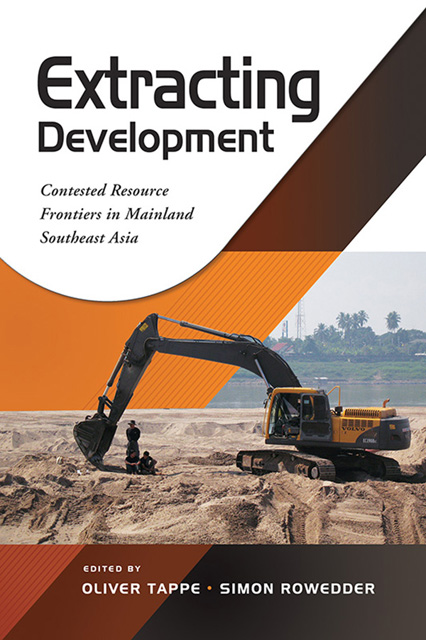Book contents
- Frontmatter
- Contents
- Acknowledgements
- The Contributors
- 1 Contested Resource Frontiers in Mainland Southeast Asia: An Introduction
- 2 Ontological Politics of the Resource Frontier: A Hydrosocial Analysis of the Mekong River in Northern Thailand
- 3 Reassembling Frontiers for Middle-Income Peasants: Rubber Expansion and Livelihood Ecosystem Transformation in a Northeast Thai Village
- 4 “Only the Best Fruits for China!”: Local Productions of a ‘Fruit Frontier’ in the Borderlands of China, Laos and Thailand
- 5 Commodity Frontiers in Motion: Tracing the Maize Boom across the Lao-Vietnamese Borderlands
- 6 New Frontier Spaces: Complex Entanglements and Power Relations (Re)shaping Land Governance in Laos
- 7 Moving Away from the Margins? How a Chinese Hydropower Project Made a Lao Community Modern and Comfortable
- 8 Frontier Capitalism in Colonial and Contemporary Laos: The Case of Tin Mining
- 9 Chinese Investments and Resource Frontiers in Cambodia: Systemic Transformation
- 10 The Open Issues: Cases between Chinese Investment Companies and Local People in Myanmar
- 11 Internationalization of RMB and Tin Ore Trade in China-Myanmar Frontier Governance: Views from Yunnan Province
- Index
10 - The Open Issues: Cases between Chinese Investment Companies and Local People in Myanmar
Published online by Cambridge University Press: 30 June 2023
- Frontmatter
- Contents
- Acknowledgements
- The Contributors
- 1 Contested Resource Frontiers in Mainland Southeast Asia: An Introduction
- 2 Ontological Politics of the Resource Frontier: A Hydrosocial Analysis of the Mekong River in Northern Thailand
- 3 Reassembling Frontiers for Middle-Income Peasants: Rubber Expansion and Livelihood Ecosystem Transformation in a Northeast Thai Village
- 4 “Only the Best Fruits for China!”: Local Productions of a ‘Fruit Frontier’ in the Borderlands of China, Laos and Thailand
- 5 Commodity Frontiers in Motion: Tracing the Maize Boom across the Lao-Vietnamese Borderlands
- 6 New Frontier Spaces: Complex Entanglements and Power Relations (Re)shaping Land Governance in Laos
- 7 Moving Away from the Margins? How a Chinese Hydropower Project Made a Lao Community Modern and Comfortable
- 8 Frontier Capitalism in Colonial and Contemporary Laos: The Case of Tin Mining
- 9 Chinese Investments and Resource Frontiers in Cambodia: Systemic Transformation
- 10 The Open Issues: Cases between Chinese Investment Companies and Local People in Myanmar
- 11 Internationalization of RMB and Tin Ore Trade in China-Myanmar Frontier Governance: Views from Yunnan Province
- Index
Summary
INTRODUCTION
With increasing foreign direct investment (FDI) flow from China, Myanmar's economic growth is depending more and more on Chinese investment. According to FDI data for 1988–2018, China is clearly the number one foreign investor in Myanmar (see as well Mierzejewski, this volume and 2021). Even though the investments coming from China into Myanmar are beneficial in many respects, they entail some major problems. Those are exemplified by the series of strikes that broke out related to three major development projects: The Letpadaungtaung copper mine project, the gas pipeline project, and the Myitsone dam project. As the latter two had been contracted by the former military government before the drafting of the 2008 Constitution, no impact assessments had been conducted and transparency was lacking. As the political reforms that ensued the passage of the 2008 Constitution have initially appeared successful, Myanmar people hoped to move forward in building a democratic nation as guaranteed by the Constitution. They aspire to participate in the decision-making concerning both businesses as well as political affairs. Myanmar, as an International Person, respects the ratified International Conventions and carries out their provisions by integrating them into national laws. Likewise, Myanmar Parliament has moved forward to update the national laws according to international standards of foreign investment, environmental and social impacts, employment, land rights and political reforms.
This paper investigates the three aforementioned Chinese investment cases such as the Letpadaungtaung copper mine project by the Wanbao Company, the gas pipeline project by China's National Petroleum Corporation, and the Myitsone dam project by the Chinese Power Investment Company. The Belt and Road Initiative (BRI) provides a new context for these open issues of environmental, social and human rights. The paper addresses the question of how to reduce the negative local impacts of Chinese investment projects that are allegedly dedicated to Myanmar's sustainable development. Local people had often not been informed about the projects before construction started. Moreover, the projects neglected the human rights impact assessment for local people and indigenous people. It is evident that the “Free, Prior and Informed Consent” method of public participation was not used.
- Type
- Chapter
- Information
- Extracting DevelopmentContested Resource Frontiers in Mainland Southeast Asia, pp. 221 - 239Publisher: ISEAS–Yusof Ishak InstitutePrint publication year: 2022



